Joseph Siegle, director of research at the Africa Center for Strategic Studies, joins host Aloysius Uche Ordu for a conversation on Nigeria’s upcoming presidential election, on February 25, and other elections in Africa this year. Dr. Siegle explains the importance of Nigeria’s election, including the key role youths and civil society organizations will play, plus security challenges the West African nation faces.
See also:
- Subscribe and listen to Foresight Africa on Apple, Spotify, and wherever you listen to podcasts.
- Learn about other Brookings podcasts from the Brookings Podcast Network.
- Sign up for the podcasts newsletter for occasional updates on featured episodes and new shows.
- Send feedback email to [email protected].
TRANSCRIPT
[music]
ORDU: I’m Aloysius Uche Ordu, director of the Africa Growth Initiative at the Brookings Institution, and this is Foresight Africa podcast.
Since 2011, the Africa Growth Initiative at Brookings has published a high profile report on the key events and trends likely to shape affairs in Africa in the year ahead. Entitled Foresight Africa, the goal of the publication is to bring attention to these burning issues and to support policy actions to address them.
This is season two of the Foresight Africa podcast in which I engage with the report authors, as well as policymakers, industry leaders, Africa’s youths, and other key figures. . Learn more on our website, Brookings dot edu slash Foresight Africa Podcast.
My guest today is Dr. Joe Siegle, deputy director of research at the Africa Center for Strategic Studies here in the nation’s capital, Washington, D.C. Joe wrote a brilliant piece for us in Foresight Africa 2022. That piece was titled “The Future of Russia-Africa Relations.” On January 31st this year, Joe coauthored a piece on Africa’s 2023 elections, covering the seven presidential and legislative elections this year on the African continent. At a time of democratic backsliding and a return of military coups in some countries in West Africa, it is particularly reassuring to learn more about the seven elections happening on the continent this year.
So, for today’s conversation, we will focus on the Nigerian presidential and legislative elections, which are scheduled to take place this month, February 25th, 2023.
Joe, a warm welcome to Foresight Africa podcast.
SIEGLE: Thank you.
ORDU: Perhaps we can start with you telling us what you see as the key features of the Nigerian Electoral Act and the overall oversight mechanism that will underpin the elections this month.
SIEGLE: Well, Nigeria passed a very significant Electoral Reform Act in 2022, and the act continues the process of reform we’ve seen in Nigeria really since it started moving back to multiparty democracy in 1999. Specifically, this act authorized electronic voting rather than just handwritten votes and for the transmission of results electronically.
This is important because it’s seen as less prone to vote rigging. Also, the new act allows for the recording of ballots at each of the 176,000 polling stations around the country. So, again, it’s a higher standard of transparency because you’ll have the tabulations that each of the local districts, which will then be transmitted back to Abuja, where you’ll see the overall tallies. But this prevents, the risk of intervention in the tallying process at the capital, where it’s harder to discern where those changes are being made.
So, we saw this in Kenya last year and it allowed for real time reporting of results from each of the local districts, and it greatly contributed to the credibility of the outcome, even though it was very close.
So, I think those are major reforms. We saw the digital publishing of the electoral registry by the Independent National Electoral Commission. Again, this allowed for more transparency, it allowed for scrubbing of the registry where there were redundancies or mistakes made. So, all of these things, I think, are giving more confidence to the process that we’re seeing in Nigeria this time around.
ORDU: So, what exactly, Joe, is at stake here in your view? And who are the key candidates to watch and why?
SIEGLE: Well, it’s a very important election for Nigeria and for Africa. And Nigeria is facing a number of serious security challenges. In the northeast, it has had a problem with the militant Islamist groups who continue to be destabilizing. We’ve seen a growing problem of organized criminal groups in the Northwest, often called bandits, who are engaged in kidnaping for ransom and extortion of citizens or affecting road traffic and commerce in the northwest. You’re seeing challenges, or agitation, really, for separation in the south. And Nigeria’s had a long problem with oil bunkering and oil siphoning in the southwest and on the coast.
So, all these things are contributing to growing strains on the economy. Nigeria has been sort of limping along with its economy, but high levels of unemployment and just a growing sense of concern across the country. And a real question about the governability of Nigeria.
So, the value of democratic elections is it provides an opportunity for change and to do it in an organized, transparent manner. And I think that’s what’s going to be so critical about this election. There is a real debate about the future of the country.
And so, there are four main candidates that are competing for the presidency. You have a Bola Tinubu, who is the ruling party candidate from the All Progressives Congress, APC. He’s being challenged by Atiku Abubakar from the Peoples Democratic Party, PDP. Both of these are considered establishment candidates. They’re in their seventies. They’ve been very well known in the political circles of Nigeria for a long time. So, they’re seen as sort of the status quo. We’ll see similar political dynamics through those two candidates.
What’s unusual this year is that there are two other serious contenders. One is Peter Obi from the Labor Party. He’s a former governor from the Anambra State in southeast region. And then you have Rabiu Kwankwaso. He’s a former Kano state governor from the north, he’s representing the new Nigeria Peoples Party. And both these parties are sort of challenging the status quo and the stranglehold on electoral politics that we’ve seen from those two main parties. Peter Obi in particular has been generating a lot of excitement with his appeals to youth in the country. And so, that’s just infusing a lot of energy and hope for a different future for Nigeria.
ORDU: So, you mentioned the four main candidates: the establishment ones, Tinubu, Atiku, and of course, the challenger Obi and Kwankwaso of Kano. I was just wondering, do you sense that this time there might be the possibility of a runoff in this month’s election?
SIEGLE: Well, it’s a good question because, you know, Nigeria’s never had a runoff since the move to multiparty system in 1999. But many ____ are suggesting that’s a real possibility in terms of the polls that we’re seeing that’s where it looks like it’s heading. Of course, we don’t know for sure how reliable the polls are, but it does appear that no one candidate’s going to achieve the 50% majority they need. Plus, in Nigeria, you need to get at least 25% of the vote from two-thirds of Nigeria’s 36 states to secure the victory in the first round. So, at this point, it doesn’t appear likely that’s going to happen, which could be very interesting and exciting for the country and really help drill down into the different visions that the leaders have for the country.
ORDU: Let’s switch now to the role of the youths. In particular, you mentioned the youths in the context of support for Peter Obi. But broadly speaking, what do you sense as the key role the youths will play this time around that they did not play in previous elections in Nigeria?
SIEGLE: Well, I think, first off, it’s important to recognize that Nigeria, like many African countries, you have this huge gap in leadership, which is well established in the seventies or eighties. And then a majority of the population is under 30. In Nigeria, you know, 70% of the population is under the age of 30. The median age is 18. And so, you have this huge dichotomy of a youthful population, yet very established older generation politicians. And, you know, their interests aren’t always the same.
And so, indeed, the youth have been at the forefront of calling for reform and saying business as usual isn’t going to work. We need a change, we need more transparency, we need more democracy, we need more responsiveness, we need more accountability. You’ll remember the End SARS protest that dominated attention in Nigeria. These were led by youth and they were demanding more accountability from Nigeria’s police force. And really just wanting to have more citizen participation in government. There’s a real sense that there’s too much distance between citizens and government in the politics in Nigeria.
And so, there has been a lot of enthusiasm. Youth dominated the new registrants for the electoral registration. This year, about 75% of new registrants are youth. And they’re a real potential change agent for the country.
Now, we’ll have to see if they’re able to get out and vote and actually make their voices heard. And then even after election, whether they sustain their engagement and continue to push for reform, since, you know, Nigeria’s dealing with a lot of entrenched institutional issues. It isn’t just going to change with an election. It’s going to require constant pressure and transparency.
And I think on that point, it’s important to recognize and commend Nigeria’s youth. They are trying to make change through the system. They’re trying to make change through elections and through protest and using the tools of a democratic system to effect change. They haven’t turned to violence. It’s not like you’re seeing them move to rebel groups like we’ve seen in previous eras in Nigeria and Africa. And so, I think there’s a real commitment to the rule of law and to using legal systems to make change. And so, I think that will be very interesting to see how that plays out in this year’s election.
ORDU: So, under the youth issue, Joe, do you see any parallels with Kenya, which also, as you know, has a huge youth bulge, and in the last elections in August last year, there was this sense that the youths will actually dominate the agenda. I’m just wondering how that turned out and any parallels it could draw with the Nigerian situation?
SIEGLE: Well, I think the parallels are that most of Africa has a large youthful population. And so, how these political systems engage and involve youth will be critical for how things progress and what kind of trajectory these countries are going to have.
I don’t think any of us can fully grasp the significance of the change. Africa’s population is supposed to double by 2050. And that includes Nigeria with 220 million people. It’s supposed to double in 30 years. So, the strains that’s going to put on the political system, on the economic system, on social systems on land, housing, opportunities, jobs are enormous. And if that’s channeled into constructive means and there’s responsive politics and people are feeling heard and they own the system, that youth could be a hugely dynamic influence for Nigeria’s economy and for Africa more generally as these youth populations come of age.
But if it’s not managed well, you could see just further strains and fragmentation of these challenges. And so, there really needs to be the paramount issue for everybody to be grappling with and providing constructive avenues for youth to use their many skills, use their higher levels of education, use that energy to improve societies.
ORDU: Let’s turn now, Joe, to the role of these civil society organizations in Nigeria. What are your sense of how the role they will play during this critical phase in Nigeria’s transition?
SIEGLE: Yeah, well, I think civil society is very vibrant in Nigeria, and that’s a huge strength for any democratic process. It’s allowing popular participation in the process. It’s contributing to transparency. Nigeria, like other African countries, has supported through civil society parallel vote counts over the last several election cycles. And so, that has held up the standards for the electoral commission to make sure things are done transparently, in a credible manner. And civil society has been the leading actor for that.
And again, change doesn’t happen with a single election. It will require ongoing pressure and citizen engagement. The fact that Nigeria has such a active and organized civil society is a real boost for effecting change and for creating the political will for change. And so, it will have to be a combination of political change and civil society activism for us to see genuine institutional change in Nigeria.
ORDU: Joe, the debate we read about and hear about is really about the personalities—you mentioned the presidential candidates. And yet, the country is faced with enormous economic challenges. And on the eve of the election, there is this sense of a change to a new naira note, a new currency. And I understand the Court have just extended the deadline for transitioning fully to the new note. How do you see all these economic challenges impacting the outcome of the election?
SIEGLE: Well, the economy is front and center. There’s 50% unemployment for youth in Nigeria. And the country, the economy, while growing, has been somewhat stagnant. The past year, World Bank estimates that the Nigerian economy grew by 3.1%, which is not bad, but population grew by 2.6%. And so, that really cuts into the net growth that you have for the country. And, Nigeria continues to face problems with corruption and the perception that political office is the avenue for private richness. And that creates a real impediment for private sector development, that it cuts into the delivery of goods and services that government can deliver.
We should remember Nigeria is not a poor country, and Nigeria has a huge wealth, and it’s Africa’s largest economy with $450 billion in GDP. So, there’s a lot of resources there that if well used can go far to addressing the pressing needs that the country faces. Nigeria has 80 million people of its 220 million population that are deemed in extreme poverty.
So, there are some real strains. Inflation has been an issue, you know, 18, 20% inflation is higher than a lot of other countries. Many countries, of course, are facing inflationary pressures, pressures because of the pandemic, and then the Russian invasion, which spiked up food and fuel prices. But, you know, Nigeria has, I think, a particular challenge that it needs to try to bring under control there.
And so within all this, Nigeria has been trying to convert its naira to a new note that is going to be harder to counterfeit and aim to reduce corruption and try to bring more of the transactions into the formal financial system rather than leaving so much of the economy in the informal system and with a lot of counterfeit notes.
Unfortunately, the rollout of that seems to have been a little bit clunky, and there was a deadline for the conversion to have been finished by January 31st, but there weren’t enough of the new notes around and that created some panic and rush on the ATMs. They extended the date and then as you mentioned, the Supreme Court ruled that the date should be extended further so that people don’t get left with old notes that they can’t convert. So, it’s added to this sense of malaise and attention all here right before the election. So, the timing is unfortunate in that way.
ORDU: So, you alluded earlier, Joe, to some security concerns. Could you elaborate on those and how in particular they will impact the election, if at all?
SIEGLE: Well, I think there’s the overlay of insecurity. There’s a sense that Nigeria has grown more insecure and this is affecting trade and travel and even movement around the country. And, you know, it’s not just one thing. You have the militant Islamist group Boko Haram and Islamic State in West Africa in the northeast. You have the banditry, or really the organized criminal activity in the northwest, which has been most amplified in this past year and really opportunistic criminal activity, raiding communities and kidnaping for ransom, but really stoking a lot of fear in that part of the country. You have the agitation in the South for separation, and you have the oil bunkering, the piracy, that are also bleeding the economy in the south and the southwest.
And you have the problem of police violence where a lot of the citizens are afraid of the police, rather than seeing the police as a force for stability and protection for the citizens.
So, all this creates an atmosphere of fear which can be destabilizing and leads to calls for radical change that wouldn’t be in the interest of Nigeria. And I think with regards to election in particular, there have been some attacks, mostly in the south, on electoral commission polling stations and on some electoral equipment. So, that is raising some concern about whether people are going to be disenfranchised.
INEC, the National Electoral Commission, has said that it may consider delaying the elections because of insecurity. But it seems that things are going to proceed. I think there will be some disruptions. I don’t think it’s going to be widespread and I don’t think that it’s going to be systematic in a way that disenfranchises whole swaths of the population. Nonetheless, it adds another layer of uncertainty and tension to what’s going on with these elections.
ORDU: The security situation does add heightened, actually heightened tension across the country also, when you combine that with already the challenges, the kitchen table challenges that the ordinary Nigerian child, woman, and man are facing in the country right now. Let’s turn now, Joe, more broadly implications for the West African subregion and for the continent as a whole of this particular election in Nigeria at this time.
SIEGLE: Well, I think there are quite extensive implications. You know, Nigeria is the most populous country in Africa, 220 million people. It has the largest economy, and it’s the largest country on the continent that has a democratic system. And so, if Nigeria can be successful with this election, it sends a very powerful message for the role of democracy as a governing system.
You know, every country faces challenges. There’s always differences of opinion about how things should proceed. And government and different government systems are ways of trying to channel those different interests in a way that are inclusive and participatory. And democracies provide that opportunity.
As you know, West Africa has seen significant democratic backsliding and even the reemergence of coups. And some people are holding that up as a solution. I think that’s a false siren, because as we’ve seen in the places that have had coups, things have actually gotten worse on the security side, on the governance side, on the economic side. And that’s consistent with the history in Africa, where military governments have done a abysmal job of governing and, in fact, have been some of the leading sources of human rights abuses and corruption on the continent.
And so, a successful election in Nigeria could send a very powerful statement that, yes, we have troubles. Yes, democracies are not perfect. But listen, it gives us a way of trying to channel all these very different visions and strong interest and personalities in a way that is seen as credible and legitimate and where people actually have a chance to express themselves and try to influence the system.
And to do it not just in the election, but then after the election. And how do you continue to try to put pressure on the government? That’s the benefit that democracies offer. And so, they provide a built-in mechanism for course correction and to doing it in a constitutionally-based way rather than an ad hoc way with what you see with coups or other authoritarian systems.
And so, I think that’s the potential message that we see from Nigeria. And I think it’s just admirable, despite all the challenges, we see a real commitment to democratic principles in Nigeria by youth, by the media, by civil society, civil servants, by the judges try to keep a level playing field. And in that light the military has also stayed out of the political process up to this point. And so I think it’s a demonstration of a commitment to wanting to see the democratic process work.
ORDU: Joe, Nigeria, as we mentioned at the outset, is one of several. What are the other consequential elections you’re closely watching in Africa in 2023 and why?
SIEGLE: Yeah, well, all elections are important. Though, I would say all seven matter. I would highlight two others. One is the Zimbabwe election in July-August time frame. Here you have ZANU-PF trying to extend its 43 year hold on power and the incumbent, Emerson Mnangagwa, is trying to seek another term versus the challenger, Nelson Chamisa. And it’s important because Zimbabwe also is facing severe economic strains and security challenges. You have hyperinflation in Zimbabwe, 250%. The value of the currency there has dropped to a quarter of what it was in 2021. So, it’s back to the sort of economic tailspin we saw in Zimbabwe more than a decade ago. Meanwhile, there’s growing political violence and intimidation, especially on part of ZANU-PF as they try to maintain their hold on power. And so, I think it’s a real test there about whether Zimbabwe is going to be able to stabilize and whether elections are going to be a means by which you can have some systematic, legal-based means of changing a government. And, while at the same time being inclusive and participatory. So, I think Zimbabwe is the example of the challenge that we’ve seen in some of the cases where you’ve had strong liberation movements where the party and the military became intertwined, and it’s very hard for them to disentangle and allow a genuine political process to unfold. And so, I think that’s what we’ll be wanting to watch in Zimbabwe.
In the Democratic Republic of Congo, again, one of Africa’s most populist countries, you have the incumbent Félix Tshisekedi, seeking his second term. The DRC does not have a tradition of free and fair elections. And so, the question will be whether they can take some steps forward in that direction in the midst of growing instability in the east where you have M23 resurgent and worries about a return to a regional war and the Great Lakes with Uganda and Rwanda escalating tensions there.
So, the questions in DRC really are whether Tshisekedi can build on the fact that we saw the first transition of government four years ago when he came into power, taking over from Joseph Kabila, and whether we see improvements in the democratic process, whether the process is going to be fairer, whether it’s going to be inclusive, and just how much space will the leading candidates, the opposition candidates—Martin Fayulu, who many thought won last time around, and Moïse Katumbi—will they be given a fair shot? Will the counting be transparent and done in a free and fair way? There’s concerns there because we talked about the reforms made by Nigeria last year. The DRC hasn’t made these reforms. And so, you’re still working under a very opaque system which could lend itself to vote rigging. So, that election’s going to be right at the end of the year, December and so it’ll be another important one to watch.
ORDU: Great. In addition to the three you mentioned—Nigeria, Zimbabwe, and DRC—the other elections taking place on the continent this year are in Sierra Leone: presidential election on June the 24th. Gabon: presidential and legislative elections in August. Liberia: presidential elections on October 10th. And in Madagascar: presidential election in November. So, we have so much, so much to look forward to in terms of elections in Africa in the months ahead. I’ve been speaking with Joe Siegle. I’m very, very grateful for your time. Thank you for joining us to talk about elections in Africa today.
SIEGLE: Thank you. It’s my pleasure.
[music]
ORDU: I’m Aloysius Uche Ordu, and this has been Foresight Africa. To learn more about what you just heard today, you can find this episode online at Brookings dot edu slash Foresight Africa podcast. The Foresight Africa podcast is brought to you by the Brookings Podcast Network. Send your feedback and questions Podcasts at Brookings dot edu.
My special thanks to the production team, including Fred Dews, producer; Nicole Ntungire and Sakina Djantchiemo, associate producers; and Gastón Reboredo, audio engineer. The show’s art was designed by Shavanthi Mendis based on a concept by the creative firm Blossom. Additional support for this podcast comes from my colleagues in Brookings Global and the Office of Communications at Brookings.
The Brookings Institution is committed to quality, independence, and impact.
We are supported by a diverse array of funders. In line with our values and policies, each Brookings publication represents the sole views of its author(s).


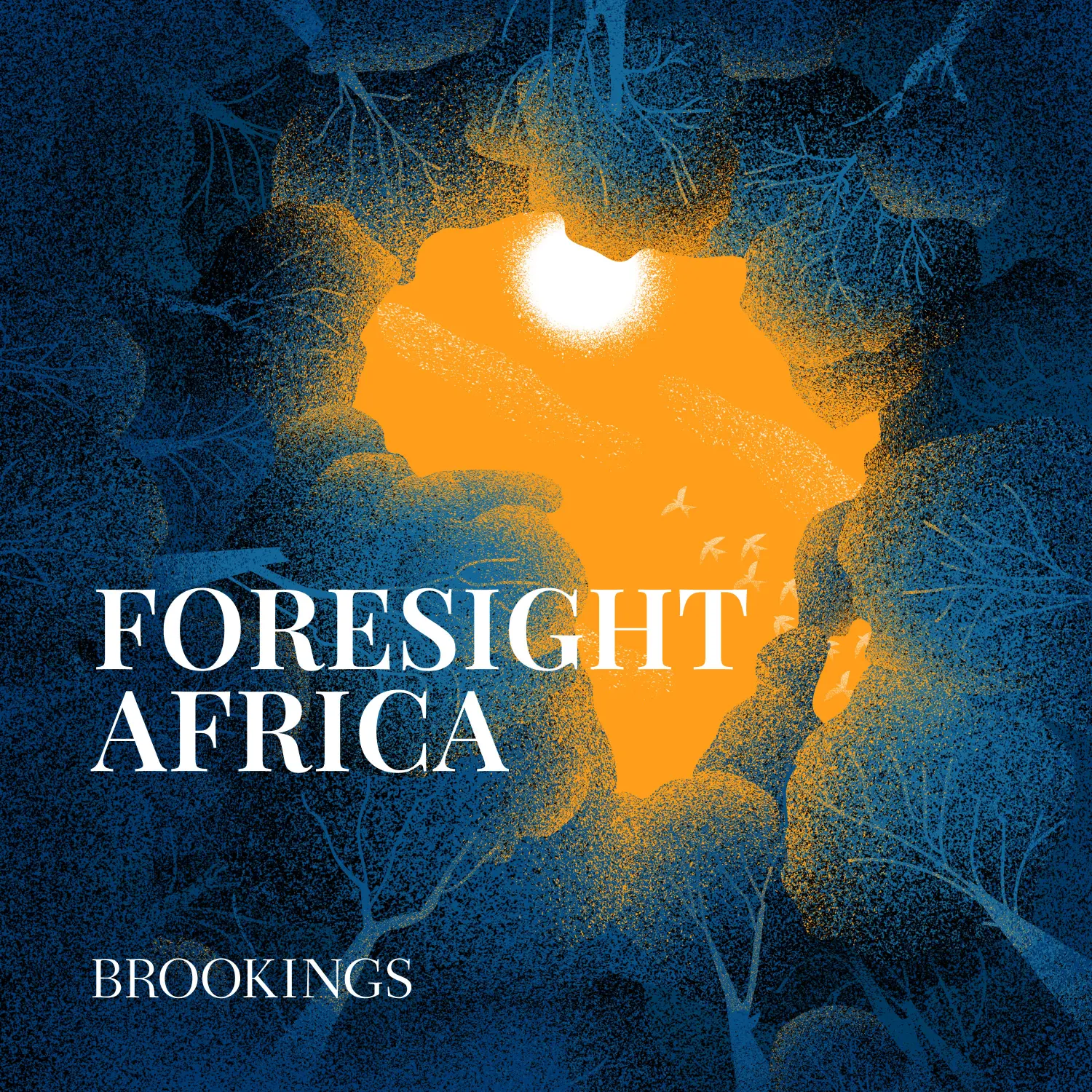
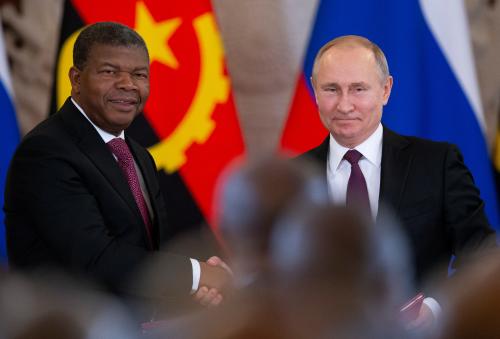
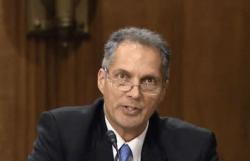
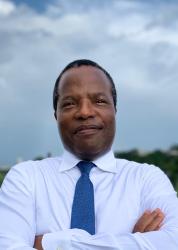
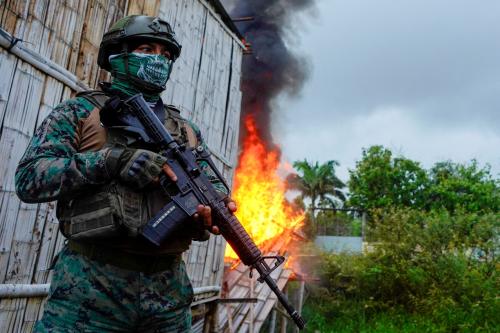
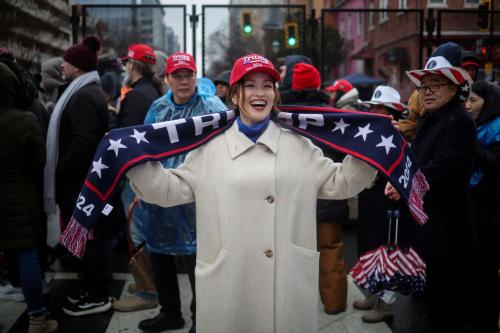
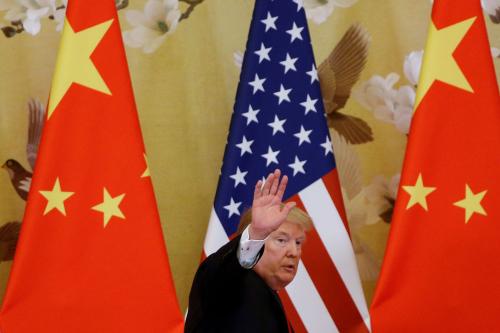
Commentary
PodcastA successful election in Nigeria would send a powerful message
February 15, 2023
Listen on
Foresight Africa Podcast